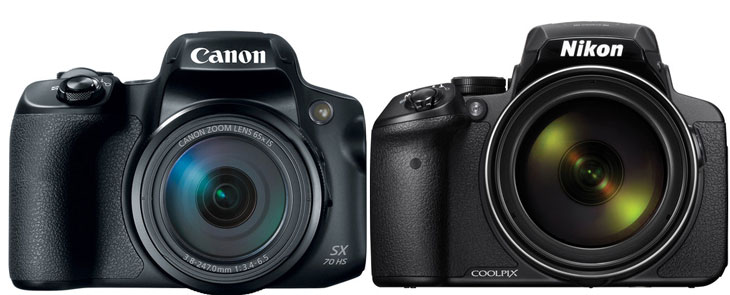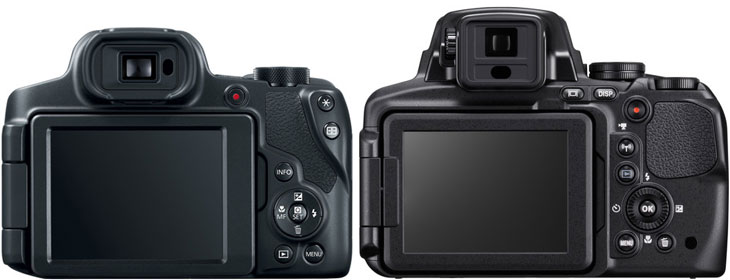
let’s do a specification comparison between the recently announced Canon SX70 HS camera under 2 year old Nikon p900 camera. More or less both camera comes at same price.
| Features/ Models | Canon SX70 HS | Nikon P900 |
| Megapixel | 20.3 Megapixel | 16 Megapixel CMOS Sensor |
| Sensor size | 1/2.3″ (6.17 x 4.55 mm) | 1/2.3″ (6.17 x 4.55 mm) |
| Low pass filter | Yes | Yes |
| Optical Zoom | 65X | 83.3X |
| Aperture Range | F3.4–6.5 | F2.8 – F6.5 |
| Macro Range | 0 cm | 1 Cm |
| Image Stabilization | Optical | Optical |
| AF system | Contrast Detect | Contrast Detect |
| AF Points | 9 AF points | 49 AF points |
| ISO | Auto, 100-3200 | Auto, 100-12800 |
| Shutter Min/ mix | 30-1/32000 | 15 sec-1/4000 |
| Continuous shooting speed | 10 fps | 7fps |
| Video | 4K @ 30fps | Full HD @60fps |
| Display | 3.0″ 922,000-Dot Fully articulated Xtra Fine LCD | 3.0″ 921k-Dot Free-Angle LCD Monitor |
| Viewfinder | Electronic (100%) | Electronic (100%) |
| Hot shoe | Yes | No |
| Wireless | WiFi and NFC | WiFi and NFC |
| Battery life | 325 shots | 360 shots |
| Dimensions | 127 x 91 x 117 mm | 140 x 103 x 137 mm |
| Weight | 605 g | 831 g |
More Resolution in Canon SX70 HS
Now in Canon SX70 HS camera the first advantage you get by looking at the Core specification is the increase resolution. You are getting at 20 Megapixel sensor with Canon SX 70 HS camera, whereas Nikon p900 limited to 16 megapixel sensor.
Nikon P900 – More Optical Zoom
Now let’s have a look at the optical zoom range of both camera, optical zoom range of a mega zoom camera is one of the most important aspects while you are picking up your next Mega zoom camera.
Canon SX70 HS camera zoom lens is limited to 65 x optical zoom most importantly the optical zoom lens of the Canon SX 70 HS camera is exactly similar to its predecessor. Whereas, Nikon p900 offers 83X optical zoom. So, if you are looking for a good Mega zoom camera, then of course Nikon p900 is best option in your front.

Nikon P900 – More Dense AF system
The Nikon P900 and Canon SX70HS both features contrast based AF system. However, feature more dense, A 39 point AF system compared to Canon SX70HS, which is limited to 9 point AF system only.
2 Stop More ISO range in Nikon P900
ISO range, the ISO range of newly announced Canon SX 70 HS camera is same as we have seen in the predecessor starts from ISO hundred and goes up to ISO 3200. Nikon P900 camera offers 2 stop more ISO range, that’s upto 12800.
Continuous Shooting Speed
Canon offers Continuous shooting speed of 10FPS which is really very impressive, Nikon P900 limited to 7 FPS. That’s you are missing 3 frames every second when you are using Nikon P900.
4K Video Recording
Canon latest announcement offers 4K Video recording at 30 Frames per second, whereas the Nikon P900 camera limited to Full HD video recording only.
Handling and Design
The Nikon P900 camera is slightly big and bit bulkier compared to Canon SX70HS camera.
Conclusion
Nikon P900 camera 83 X Optical zoom, 18X more than Canon SX70 HS camera. And 2 stop more ISO range for cleaner low-light images. But, on the other hand the Canon SX70 HS camera offers a bit faster continuous shooting speed and capability to record 4K videos. So, if you are looking for a Zoom camera under $600 than you should get the Nikon P900 or if you also want to shoot 4K videos with your megazoom camera than go with Canon SX70HS.
Buy Nikon P900 camera from Amazon and B&H
Buy Canon SX70 HS from B&H Store | Amazon.com







Correction: the SX70 HS has a 1/2.3″ sensor, not the much larger 1″ sensor. It compares to the Nikon, certainly. But that misprint would have you comparing it to the Sony RX10 or the Panasonic FZ2500, which are in an entirely different league.
This is comparing apples and oranges. It is like comparing a Nikon P1000 with a Nikon D3500.
If the SX70 is to be compared with a Nikon P series camera, it should be more appropriately compared with the P600, or its replacement, the P610.
But, the even more appropriate comparison, as I have already mentioned, would be comparing the SX70 with the Nikon B700. Those two cameras, are the most similar, and, the SX70, as I have already suggested, appears to be Canon’s equivalent of the Nimon B700.
Why that comparison is not done, is not explained.
In my last previous post,
“Canon’s equivalent of the Nimon B700.”
should have been
“Canon’s equivalent of the Nikon B700.”
Sorry.
@Dave Haynie
Thanks for the suggestion, we have corrected the info.
@Bret Busby
We will compare it with Nikon B700 also.
But, at the same time the Nikon P900 also falls in approx same price range. So, we have to compare it.
Canon sensor size 1″?
This comparison is flawed in a number of ways. The replacement for the SX60 is the SX70,equally the replacement for the P900 was the P1000. The SX70 should be compared with the P1000, not the P900.
As stated by someone else, its on the G series that have 1″ sensor, this has the much smaller 1/2.3 sensor.
Unfortunately if you did this review properly, you would probably be recommending the Nikon P1000
Andy
@Andy
We pick cameras based on features and price range, the P900 and Canon SX70HS falls on same price range.
Canon, congratulations! For taking the step, for introducing the BSI-CMOS technology in the recently presented PowerShote. White and bottled, …………. The future Canon APS-C Pro can break molds.
Canon, enhorabuena!, por dar el paso, por introducir la tecnología BSI-CMOS en la recién presentada PowerShote. Blanco y en botella, …………. La futura APS-C Pro de Canon puede romper moldes.